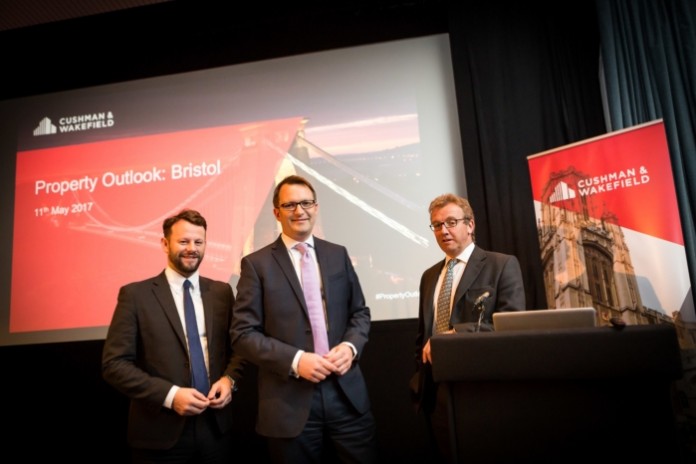
Cushman & Wakefield has presented its Bristol Property Outlook for 2017 and beyond following a year of unprecedented political change.
The breakfast presentation, held at the Watershed in Bristol city centre, revealed that the commercial property market in the South West has continued to thrive despite political and economic uncertainties including those resulting from Brexit.
Nick Allan, Head of Investment at Cushman & Wakefield’s Bristol office, discussed the outlook for the regional property market and what opportunities lay ahead.
In 2016 the South West market largely reflected the national picture as occupiers and investors sat tight in the lead up to the EU referendum and the following uncertainty once Brexit became a reality. After a difficult year in the investment markets, the presentation highlighted that 2017 has seen the start of a post-Brexit consensus as the key players get on with business in a market defined by under supply in the key industrial and office markets, and a real estate industry struggling to adapt to the pace of disruption in the retail sector.
Nick Allan said: “Whilst the current climate of uncertainty raises natural concerns, we are confident that the solid underlying dynamics of the market shine through as its key drivers in the short to medium term.
“We expect a busy 12 months going forward, with strong rental growth in evidence in both the industrial and Bristol city centre office markets, and investor interest, including international capital, remaining strong. The latter being evidenced by Cushman & Wakefield’s sale this week of Accolade Park in Bristol for £62 million to a consortium of South Korean institutional investors.
“In the residential market the burgeoning institutional investment in the private rented sector looks set to continue in Bristol and filter out to the rest of the region. Amongst regional markets Bristol is leading the charge with a pipeline of up to 2,000 units and only 171 units within central Bath.”
He added: “The region will continue to suffer from build cost inflation, which could hold back the supply of much needed new space within the regional economy. We feel that as in past cycles, brave developers who commit to providing space will be rewarded with strong tenant demand and financial exits.”
Richard Pickering, Head of Futures Strategy at Cushman & Wakefield discussed the UK economy and Macro Considerations. He commented: “In spite of the considerable political uncertainty, the UK economy has so far remained remarkably robust. There is a series of good news stories underpinning Bristol’s prospects, including a high weighting to growth sectors. Therefore, although we are anticipating a moderated rate of rental growth across the UK, Bristol is set to outperform considerably in most markets in the years to come. Longer term there are deeper structural issues around tech and disruption that are likely to have a bigger bearing on UK real estate than Brexit.”
Head of Global Occupier Services at Cushman & Wakefield James Maddock completed the presentations with a whirlwind tour of what he called ‘The GIG Economy2’, looking at technology, disruptors, sharing and new work practices and the exponential speed of change in technology and society.
The event concluded with a panel debate including Jason Collard, Managing Director of the Studio HIVE and lead development advisor on YTL’s Filton Airfield development who discussed plans for the 355 acre scheme which will be one of the largest urban regeneration schemes in the UK.




















